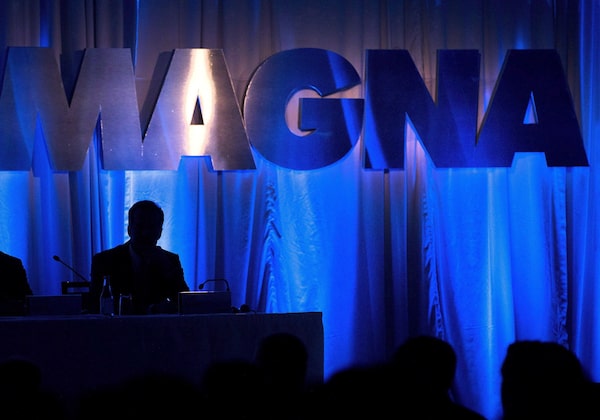
Magna is closely tied to overall auto-sector economics.Nathan Denette/The Canadian Press
For investors leery of the erratic electric-vehicle space, there’s a back door.
Canadian auto-parts giant Magna International Inc. is emerging as a key supplier in an increasingly electrified world.
At the company’s investor day last week, management laid out its plan to align with “industry megatrends,” by migrating toward systems and components for EVs rather than internal-combustion vehicles.
In addition, Magna’s stock also serves as a cyclical recovery play, as the auto industry storms back from the collapse in sales brought on by the pandemic.
“Magna is in an absolute sweet spot,” said David Burrows, president and chief investment strategist at Barometer Capital Management. “The auto industry is going through a major innovation cycle, and Magna is a global business at the centre of it.”
EV stocks got caught up in the wave of green investing that captured investors’ attention last year. The poster child for the space, Tesla Inc. , saw its share price rise tenfold between the end of 2019 and this past January.
But then the market’s preferences shifted away from growth and speculative plays toward cyclical and value names. Tesla’s stock is down by 19 per cent over the past month.
All sorts of companies associated with EVs followed a similar trajectory, from battery makers to companies developing charging technology to miners of battery metals such as lithium and cobalt. Facedrive Inc. , a TSX Venture-listed startup focusing on “ecofriendly” ride-sharing, is down by 70 per cent since February, for example.
“A lot of these speculative electric-vehicle and battery companies, they will go to zero,” said Jason Mann, chief investment officer at Toronto-based EdgeHill Partners. “We’re in the early part of that cycle.”
A growing threat to development-stage EV companies is the fact that their mass-market counterparts are starting to invest heavily in electrification. This week, Toyota Motor Corp. introduced its first electric SUV, one of 15 EV models the company plans to introduce in the next four years. Last month, Volkswagen announced it would build six battery factories in Europe, which could cost nearly US$30-billion.
“It is undeniable that the auto industry is on the brink of a once-in-a-century revolution, driven by technology advancement in electrification, autonomy, mobility and connectivity,” Bank of America analyst John Murphy wrote in a recent note.
Last year, Magna teamed up with LG Electronics to manufacture EV parts, including electric motors and inverters. It has recently been rumoured that the joint venture is close to landing a deal to produce an electric vehicle for Apple Inc.
While the production volume involved would likely be modest, a partnership with Apple would be a milestone in Magna’s evolution, Credit Suisse analyst Dan Levy wrote in a note. “It would be a key positive for Magna, solidifying arguably a leading position in EV contract manufacturing, and reinforcing the positive EV opportunity … ahead.”
Magna, which also partners with big automakers to make all kinds of components, is closely tied to overall auto-sector economics. So they all suffered in unison when the global auto cycle peaked and went into decline.
In the five years up to the point the pandemic sparked a bear market, Magna’s stock mostly traded sideways, before losing 50 per cent of its value as auto sales cratered in the midst of widespread lockdowns.
Since global stock markets bottomed out in March, 2020, Magna’s stock has gained 215 per cent, riding a global economic recovery and a booming rebound in auto sales.
U.S. vehicle sales last month hit a seasonally adjusted annual rate of 17.75 million units, making it the second-strongest March on record. That pace of sales will need to continue just to make up for the “lost sales” in 2020, which a recent TD report estimated to be 2.3 million to 2.5 million vehicles.
As more and more of those sales migrate from gasoline-powered vehicles to EVs, Magna is in a unique position to cater to that pivot with relative ease, said John Zechner, president of wealth management company J. Zechner Associates.
Magna recently disclosed that only about 10 per cent of its revenue is derived from lines of business specific to internal combustion engines. Most vehicle components are the same regardless of the propulsion system.
In other words, while automakers are plowing billions into making the shift to EV, 90 per cent of Magna’s existing business is relevant to EV production. “Magna is probably better positioned for this migration than the actual OEMs,” Mr. Zechner said.
Be smart with your money. Get the latest investing insights delivered right to your inbox three times a week, with the Globe Investor newsletter. Sign up today.
 Tim Shufelt
Tim Shufelt